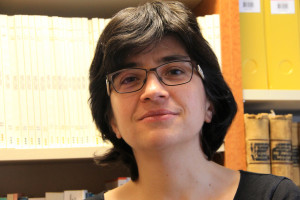Carole Bonnet
presents INED’s economic demography research unit

Carole Bonnet is an INED researcher working in the Economic Demography Research Unit. She works mainly on economics of retirement and ageing and is currently researching gender inequalities in these areas, intergenerational transfers and connections between occupational trajectories and family events.
(Interview conducted in April 2013).
What questions do INED economists work on?
Some examples: What are the effects of the current economic
crisis on fertility? Is there a link between change or loss of
employment and union dissolution? How are gender disparities in
retirement pensions going to evolve? Does the impact of a birth on
a woman’s occupational career depend on her age.
At INED - and this is one particularity of research here - such
questions are answered by closely combining economics and
demography. In general, our studies focus on the determinants of
demographic behaviour but also on their economic effects.
Researchers in our unit are also concerned with the effects of
social policies on individual or family behaviour.
Our research studies have led INED to develop long-standing ties
with the economics departments of certain universities, receiving
their doctoral students and collaborating on a regular basis with
associate researchers. In the last few years our ties with the
Université de Paris 1 and the Ecole d’Economie de Paris (EEP) have
grown particularly strong.
What are INED’s relations with Paris 1 and the EEP?
They involve both joint research projects and teaching
programmes.
In 2011, a "laboratory of excellence" (Labex) coordinated by the
EEP and called Ouvrir la Science Economique (OSE) was selected to
receive funding under the Investissements d’Avenir programme of the
Grand Emprunt [France’s state research funding loan scheme]. INED’s
involvement in this laboratory has strengthened its ties with the
EEP. One objective of this particular Labex is to explore the
boundaries between economics and the social and cognitive sciences.
Claudia Senik (Paris Sorbonne), Stéphane Gauthier (Paris 1) and I
head the research section called Inégalités et Economie Publique.
Moreover, in 2012, in connection with another Labex called iPOPs,
hosted this time by INED, our economic demography unit and the
Université de Paris 1 set up a joint economics-demography chair.
Benoît Rapoport, a lecturer at Université Paris 1, was hired for
the post and will now be able to concentrate on his research
project for the next five years while assuming a reduced teaching
load.
Could you detail some of the collaborative programmes under way?
Last year our economic demography unit was instrumental in setting up two seminar programs that bring together researchers working on similar topics but otherwise dispersed in different universities and research centres. The first workshop focuses on regional and urban economics and is coordinated for INED by Laurent Gobillon. I head the second, on economic demography (Paris Seminar on Economic Demography), together with Hippolyte d’Albis of Université Paris 1 and Najat El Mekkaoui of Université Dauphine. Every month we meet with around thirty economists working on population questions and interested in economics of the family, ageing, health and migration. Representatives of institutions concerned with, for example, ageing issues (retirement, dependence) also attend the seminars. Each session focuses on a particular topic and includes talks by a "Parisian" researcher and a researcher from another country. Our next session is on the impact of pension and unemployment insurance reforms on the employment levels of older workers.
